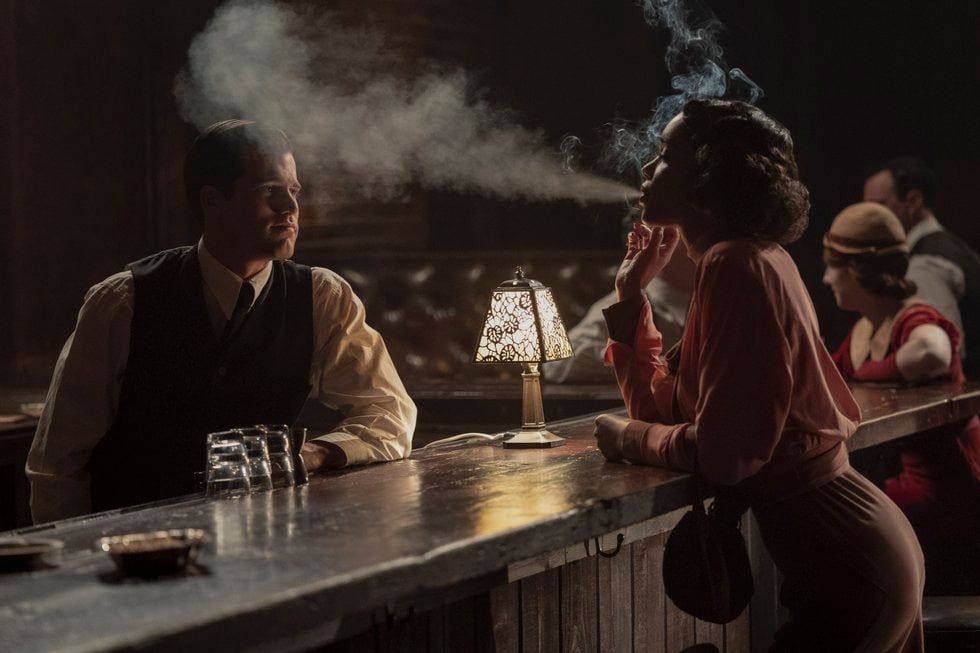
HOLLYWOOD (Ryan Murphy and Ian Brennan). All seven episodes begin streaming on Netflix Canada Friday, May 1. Rating: NNN
By episode three, Ryan Murphy and Ian Brennan’s Netflix mini-series Hollywood really got to me. It’s 1947, and A Double Life director George Cukor is having a party. His guests include behind-the-scenes power players, A-list celebrities like Vivien Leigh and an up-and-coming actor named Roy Fitzgerald, aka Rock Hudson.
The episode is called Outlaws. The setting is instantly familiar to anyone who has read about Scotty Bowers. The Hollywood gigolo claims to have serviced these men and women who worked by the Hays Code but lived by extremely different rules. Cukor was discreetly gay. His parties were notorious for being a safe playground for closeted queer and bisexual celebrities, among them Cary Grant, Katherine Hepburn and Cole Porter.
These parties have been recounted in books, articles and documentaries in salacious tabloid detail. But Murphy and Brennan mine this particular scene, packed with celebrities and nude gigolos, for emotion and purpose.
At Cukor’s party, predatory agent Henry Wilson (Jim Parsons), a real-life figure, gets pushback from a desperate actor named Jack (David Corenswet) who finally sets limits to what he’s willing to do for a gig. Joe Mantello’s Dick, the head producer at fictional studio Ace Pictures, grapples with his homosexuality and moral compass, struggling to realize that being queer and being a good man can go hand-in-hand. Then there’s Rock Hudson (Jake Picking), the stiff actor we remember from Douglas Sirk’s melodramas. He clumsily but assertively speaks up for what he wants: not a fling but a meaningful relationship with Archie (Jeremy Pope), a gay Black man with unlikely plans to be a screenwriter while he turns tricks for money.
I was moved by an episode that takes something usually portrayed as lurid and recasts it as something heartfelt. That’s the show’s methodology and by this point in the seven-episode season, Hollywood is just getting started.
At its worst, Hollywood is earnest and cheesy. It’s an epic movie stretched into an uneven miniseries that could be culled to six episodes. The final victory lap is especially grating, as Murphy and Brennan pat themselves on the back for hammering home points about the importance of representation onscreen. There is an inherent victory in such a diverse show executive produced by Murphy’s Pose collaborator Janet Mock, a transgender rights activist who also co-writes and directs two of Hollywood’s better episodes. But please hold your applause for after the credits roll.
That Outlaws episode lays out what this series achieves at its finest. Murphy and Brennan give us a colourful and cheery portrait of Hollywood’s Golden Age while tackling the seedy side of an inhumane business. They don’t pander, La La Land style. Instead, they shine a light on the marginalized characters who worked in its shadows, whether playing demeaning roles onscreen or earning money in motels. Hollywood also has fun tweaking history, Tarantino-style, to empower those characters and give them a happy ending.
Dick, Jack and Rock leave Cukor’s party with a renewed sense of self and purpose. Along with a half-Asian director (Darren Criss), they go about making a movie about Peg Entwistle, the young actor who climbed up the H on the Hollywoodland sign and leapt to her death.
But as the series continues, Entwistle’s tragic and true story about crushed dreams in Hollywood gets flipped into a vehicle for hope. The series has a crafty way of taking one metaphor and turning it into another as it morphs into a delightful screwball comedy built on “what ifs.”
What if a woman, like the one played wonderfully by Tony Award winner Pattie Lupone, seized the reigns at a Hollywood studio and stuck a middle finger up to Southern theatres, the KKK and the Hays code by giving opportunities to BIPOC talent?
What if a young Black woman, like the one played by Laura Harrier, or legendary Chinese-American actor Ana May Wong (Michelle Krusiec), got to play characters that weren’t crude stereotypes? What if Mira Sorvino’s career had a second lease after her victimization by Harvey Weinstein? That last bit isn’t a plot thread, but a thought inspired by Sorvino’s meaningful casting in the series as an actor who gets a second chance.
The what ifs keep piling up in this wilfully naive series. But it’s good fun while it lasts.
@justsayrad












